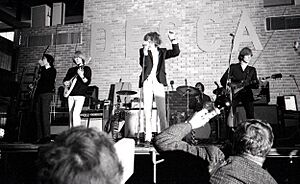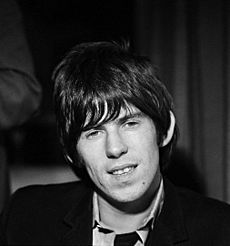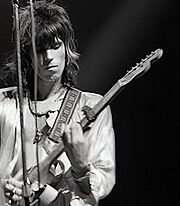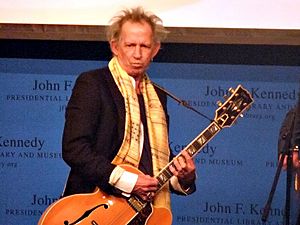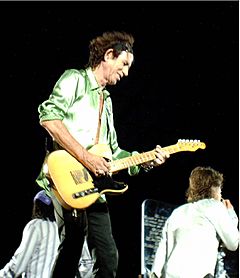Keith Richards facts for kids
Quick facts for kids
Keith Richards
|
|
|---|---|
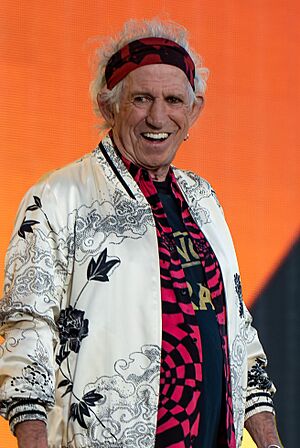
Richards in 2022
|
|
| Born | 18 December 1943 Dartford, Kent, England
|
| Other names | Keith Richard |
| Education | Dartford Technical School Sidcup Art College |
| Occupation |
|
| Years active | 1960–present |
| Spouse(s) |
Patti Hansen
(m. 1983) |
| Partner(s) | Anita Pallenberg (1967–1980) |
| Children | 5, including Theodora and Alexandra |
| Musical career | |
| Genres | |
| Instruments |
|
| Labels |
|
Keith Richards (born 18 December 1943) is an English musician, songwriter, and singer. He is a founding member of the famous rock band the Rolling Stones. In the band, he plays guitar, sings backup vocals, and writes songs.
For over sixty years, Richards has been a key part of the Rolling Stones. His partnership with lead singer Mick Jagger has created some of the most famous songs in rock history. Richards's unique guitar playing is a signature sound of the band. Early in his career, he was known as Keith Richard, but he went back to his real last name in 1978.
Besides his work with the Stones, Richards has his own band called The X-Pensive Winos. He also acted in two Pirates of the Caribbean movies. He played Captain Teague, the father of Jack Sparrow. The character of Jack Sparrow was actually inspired by Richards himself.
Richards and the Rolling Stones were welcomed into the Rock and Roll Hall of Fame in 1989. Rolling Stone magazine has named him one of the greatest guitarists of all time.
Contents
Early Life and Musical Beginnings
Keith Richards was born in Dartford, Kent, England, during the Second World War. He was the only child of Doris and Herbert Richards. His father was a factory worker who was injured in the war.
Richards's interest in guitar came from his grandfather, Augustus "Gus" Dupree. Gus was a musician who played in a jazz band. He teased young Keith with a guitar on a high shelf. Gus told him that if he could reach it, he could have it. Richards tried everything to get the guitar and finally succeeded. His grandfather then taught him his first song, "Malagueña".
Richards went to the same primary school as Mick Jagger. They were neighbors for a while before their families moved. In 1959, Richards was expelled from his school for skipping classes. He then went to Sidcup Art College, where he spent more time playing guitar than studying. He became very good at playing the solos of his hero, Chuck Berry.
One day, Richards met Jagger again on a train platform. Jagger was carrying blues albums, and they realized they shared a love for the same music. They started a band with their friend Dick Taylor. Soon after, they met Brian Jones and Ian Stewart and formed the group that would become the Rolling Stones.
Career with The Rolling Stones
As a member of the Rolling Stones, Richards is known for his amazing guitar skills. He plays both lead and rhythm guitar, often switching between the two in the same song. This "weaving" style of two guitars playing together is a trademark of the band. He has shared this role with Brian Jones, Mick Taylor, and Ronnie Wood over the years.
Richards also sings lead vocals on some songs. He usually sings at least one song at every concert. Some of these songs include "Happy" and "Before They Make Me Run".
Many people see Richards as the leader of the band. Former band members have said that the group follows his lead during performances. Richards himself says his job is to keep the band running smoothly, like "oiling the machinery".
A Legendary Songwriting Team
Richards and Mick Jagger started writing songs together in 1963. Their manager, Andrew Loog Oldham, encouraged them to write their own music. At first, they wrote songs for other artists.
Their first big hit for the Rolling Stones was "The Last Time" in 1965. Soon after, they wrote "(I Can't Get No) Satisfaction", which became a number-one hit around the world. Richards famously said the main guitar part for "Satisfaction" came to him in a dream.
The songs written by Jagger–Richards mix many styles of music. They include blues, rock and roll, pop, and country. This partnership is one of the most successful in music history.
Unique Guitar Style
Richards is famous for his use of open tunings on his guitar. His favorite is an open G tuning with only five strings. He removes the lowest string because he feels it gets in the way. This special tuning can be heard on famous songs like "Honky Tonk Women" and "Start Me Up".
He believes that playing acoustic guitar is very important. He uses it on many Rolling Stones tracks, including "Angie". He feels it helps him keep his touch and skill as a musician.
Solo Work and Other Projects
Besides the Rolling Stones, Richards has worked on his own music. In 1987, he formed a band called the X-Pensive Winos. The band included talented musicians like Steve Jordan and Waddy Wachtel. They released two studio albums, Talk Is Cheap and Main Offender. Richards also released a solo album called Crosseyed Heart in 2015.
He has also worked with many other famous artists. He played bass with John Lennon and Eric Clapton in a group called The Dirty Mac. He has recorded with Aretha Franklin, Tom Waits, and reggae group Toots & the Maytals.
In 2006, Richards had an accident while on vacation in Fiji. He fell from a tree and needed surgery on his head. This delayed a Rolling Stones tour, but he made a full recovery.
Legacy and Honors
Keith Richards is considered a rock and roll legend. Rolling Stone magazine has called him the creator of "rock's greatest single body of riffs". The magazine has also listed him as one of the best guitarists ever. Fourteen songs he wrote with Jagger are on the magazine's list of the "500 Greatest Songs of All Time".
In 2023, a statue of Richards and Mick Jagger was put up in their hometown of Dartford to honor them. In 2025, Richards received the Connecticut Governor’s Award of Excellence for his contributions to music and culture.
His influence on music continues to inspire new generations of guitarists and songwriters around the world.
Famous Guitars
Richards owns about 3,000 guitars, but a few are especially famous.
| Type | Notes |
|---|---|
| 1959 Gibson Les Paul Standard | This was one of his main guitars in the mid-1960s. He later sold it to his future bandmate, Mick Taylor. |
| 1953 Fender Telecaster "Micawber" | This is his most famous guitar. It is named after a character from a Charles Dickens novel. He tunes it to his special five-string open-G tuning. |
| 1954 Fender Telecaster "Malcolm" | This is another Telecaster set up for five-string open-G tuning. It has a natural wood finish. |
| Gibson ES-355 | Richards has used this type of semi-hollow guitar on every tour since 1997. |
| Ampeg Dan Armstrong plexiglas guitar | A clear guitar he used in the late 1960s and early 1970s. It can be heard on the live album Get Yer Ya-Ya's Out. |
Film Roles
| Year | Title | Role | Notes |
|---|---|---|---|
| 2002 | The Simpsons | Himself | "How I Spent My Strummer Vacation" (voice) |
| 2007 | Pirates of the Caribbean: At World's End | Captain Teague | Won an award for Best Cameo |
| 2011 | Pirates of the Caribbean: On Stranger Tides | Captain Teague |
See also
 In Spanish: Keith Richards para niños
In Spanish: Keith Richards para niños
 | Madam C. J. Walker |
 | Janet Emerson Bashen |
 | Annie Turnbo Malone |
 | Maggie L. Walker |


